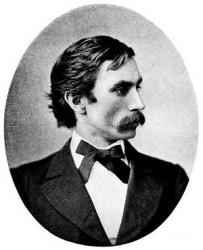- |
User Links
Richard Watson Gilder

www.hymntime.com/tch
| Short Name: | Richard Watson Gilder |
| Full Name: | Gilder, Richard Watson, 1844-1909 |
| Birth Year: | 1844 |
| Death Year: | 1909 |
Gilder, Richard Watson, LL.D., was born at Bordentown, N.J., Feb. 8, 1844, and educated at a Seminary at Flushing, L.I. He was associate-editor of Scribner's Monthly (now The Century) from its commencement in 1870 to 1881, when, on the death of J. G. Holland, he became editor-in-chief. His poetical works are somewhat numerous, and include The New Day, 1875; Lyrics, 1885; Two Worlds, 1801; Poems and Inscriptions, 1901; and In the Heights, 1905. His hymns in common use are:—
1. In myriad forms, by myriad names. [ Divine Incomprehensibility.] This, in In Excelsis, N.Y., 1897, is composed of the last two stanzas of a hymn sung at the presentation of the Egyptian Obelisk to the City of New York, Feb. 22, 1881. The hymn is in his Lyrics,
1885, p. 5.
2. To Thee, Eternal Soul, be praise! [God speaking through His Saints.] Written for the Methodist Hymnal, N.Y., 190 [Rev. L. F. Benson, D.D.]
--John Julian, Dictionary of Hymnology, New Supplement (1907)
=======================
Gilder, Richard Watson, L.L.D. (February 8, 1844--November 18, 1909). Dr. Guilder's schooling began at his father's school for girls at Belle Vue, Bordentown, New Jersey, where he was the only boy enrolled. Details of his further education are vague, but the future editor began his journalistic work at the age of twelve or thirteen by publishing a paper of his own. He read law for a time before becoming a reporter on Newark, New Jersey, papers. In 1863, he joined a volunteer company of the Union Army, the First Philadelphia Artillery, but saw little actual combat service. Later he acted as paymaster for a railway company. He was a pioneer in magazine illustration beginning with his early association with Scribner's. Always a leader in plans for civic betterment, he was quite active through his late years; though in failing health he delivered a public lecture only two weeks before his death, which occurred at the home of a friend in New York City.
His real contribution to American literature was as editor of an excellent literary magazine rather than through his own writing. He was the recipient of many honorary degrees from various educational institutions.
Sources: Dictionary of American Biography; Appleton's Cyclopedia of American Biography; National Cyclopedia of American Biography; Who Was Who I.
Access an additional article on the Canterbury Dictionary of Hymnology:


 My Starred Hymns
My Starred Hymns

